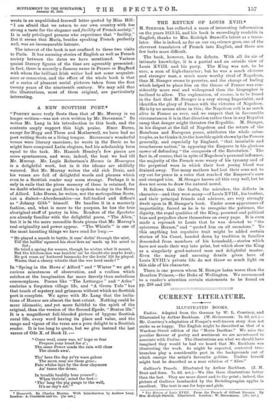THE RETURN OF LOUIS XVIII*
M. STENGER has collected a mass of interesting information on the years 1813-15, and his book is exceedingly readable in English, thanks to Mrs. Rodolph Stawell's talent as a trans- lator. She is indeed, as far as our experience goes, one of the cleverest translators of French into English, and there are few tasks more difficult.
The book, however, has its defects. With all its air of intimate knowledge, it is a partial and an outside view of Louis XVIII. and his party. The King was not, to be sure, a man of high character; but be was a much cleverer and stronger man, a much more worthy rival of Napoleon, than M. Stenger seems to perceive, and the change of feeling which helped to place him on the throne of France was con- siderably more real and widespread than the biographer is inclined to allow. The explanation, of course, is to be found in the fact that M. Stenger is a very strong Imperialist, and identifies the glory of France with the victories of Napoleon. He is by no means alone in this ; the Napoleon cult is as much alive in France as ever, and we suspect that in favourable circumstances it is in that direction rather than in any Royalist camp that danger might threaten the Republic. M. Stenger, in his disgust at the fall of Napoleon and the return of the Bourbons and European peace, attributes the whole catas- trophe, as he thinks it, to the horrible spirit shown by the Powers generally, and especially by England, "that insatiable and treacherous nation," in opposing the Emperor in his glorious career of defending "the conquests of the Revolution." The fact is, of course, that in spite of Napoleon's personal influence, the majority of the French were weary of his tyranny and of the perpetual wars in which their best young blood was drained away. Too many mothers had lost their sons not to cry out for peace in a voice that reached the Emperor's ears and enraged him. M. Stenger knows all this very well, but he does not seem to draw the natural moral.
It follows that the faults, the mistakes, the defects in character—and they were many—of Louis XVIII., his brother, and their principal friends and advisers, are very strongly dwelt upon in M. Stenger's book. Under some appearance of impartiality, forced as he is to recognise the patience, the dignity, the regal qualities of the King, personal and political bias and prejudice show themselves on every page. It is even made a reproach to Louis that he was devoted to "the epicurean Horace," and "quoted him on all occasions." To this anything but repulsive trait might be added certain stories of his Court, handed down by tradition in families descended from members of his household,—stories which have not made their way into print, but which show the King as a singularly good-natured man and delightful master. Even the many and amusing details given here of Louis XVIII.'s private life do not throw so much light on this side of his character.
There is one person whom M. Stenger hates worse than the Bourbon Princes,—the Duke of Wellington. We recommend to a reader's attention certain statements to be found on pp. 298 and 299.






















































 Previous page
Previous page